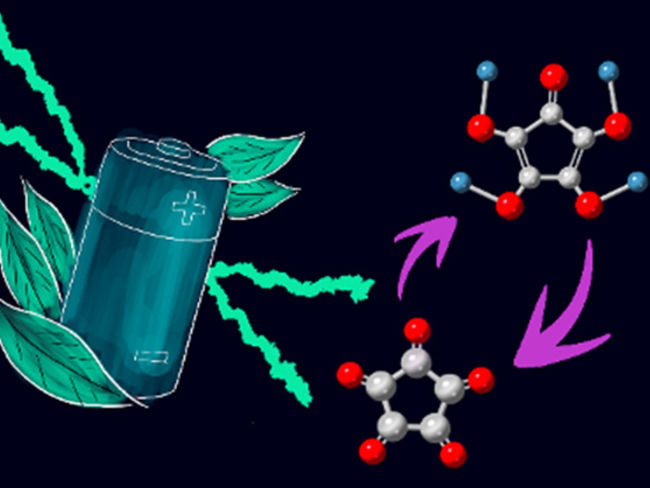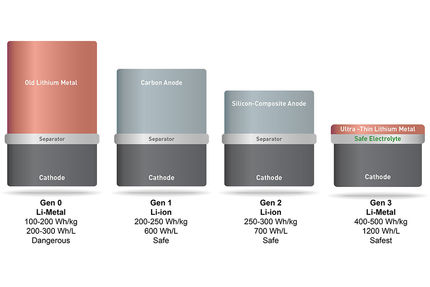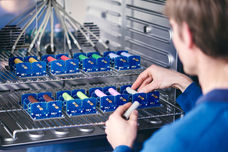A 4 V-class metal-free organic lithium-ion battery gets closer to reality
High-voltage environmentally friendly organic lithium-ion batteries
Advertisement
A joint research team from Tohoku University and the University of California, Los Angeles (UCLA) has made a significant advancement towards high-voltage metal-free lithium-ion batteries that use a small organic molecule, croconic acid. The breakthrough moves us closer to realizing metal-free, high-energy, and inexpensive lithium-ion batteries.

An illustration of croconic acid and an image of a high-voltage environmentally friendly organic lithium-ion batteries.
Yuto Katsuyama et al.
Unlike conventional lithium-ion batteries, which depend on rare-earth materials such as cobalt and lithium, organic batteries exploit naturally abundant elements such as carbon, hydrogen, nitrogen, and oxygen. In addition, organic batteries have greater theoretical capacities than conventional lithium-ion batteries because their use of organic materials renders them lightweight. Most reported organic batteries to date, however, possess a relatively low (1-3V) working voltage. Increasing organic batteries' voltage will lead to higher energy density batteries.
Itaru Honma, a professor of chemistry at Tohoku University's Institute of Multidisciplinary Research for Advanced Materials, Hiroaki Kobayashi, an assistant professor of chemistry at Tohoku University, and Yuto Katsuyama, a graduate student at UCLA, found that croconic acid, when used as a lithium-ion battery cathode material, maintains a strong working voltage of around 4 V.
Croconic acid has five carbon atoms bonded to each other in a pentagonal form, and each of the carbons is bonded to oxygen. It also has a high theoretical capacity of 638.6 mAh/g, which is much higher than the conventional lithium-ion battery cathode materials (LiCoO2 ~ 140 mAh/g). "We investigated the electrochemical behavior of croconic acid in the high-voltage range above 3 V using theoretical calculations and electrochemical experiments," said Kobayashi. "We discovered that croconic acid stores lithium ions at roughly 4 V, giving a very high theoretical energy density of 1949 Wh/kg, which is larger than most inorganic and organic lithium-ion batteries."
Although the theoretical capacity was not achieved in this study, the researchers are optimistic this can be enhanced by the development of stable electrolytes at high-voltage and chemical modifications to croconic acid. Since most electrolytes cannot stand for such a strong working voltage of croconic acid, developing new electrolytes is vital. Additionally, the structures of small organic molecules, including croconic acid, can be easily modified. Appropriate structural modification can stabilize the molecule, leading to greater capacity and reversibility.
Original publication
Other news from the department science
These products might interest you
Most read news
More news from our other portals
See the theme worlds for related content
Topic World Battery Technology
The topic world Battery Technology combines relevant knowledge in a unique way. Here you will find everything about suppliers and their products, webinars, white papers, catalogs and brochures.

Topic World Battery Technology
The topic world Battery Technology combines relevant knowledge in a unique way. Here you will find everything about suppliers and their products, webinars, white papers, catalogs and brochures.































































